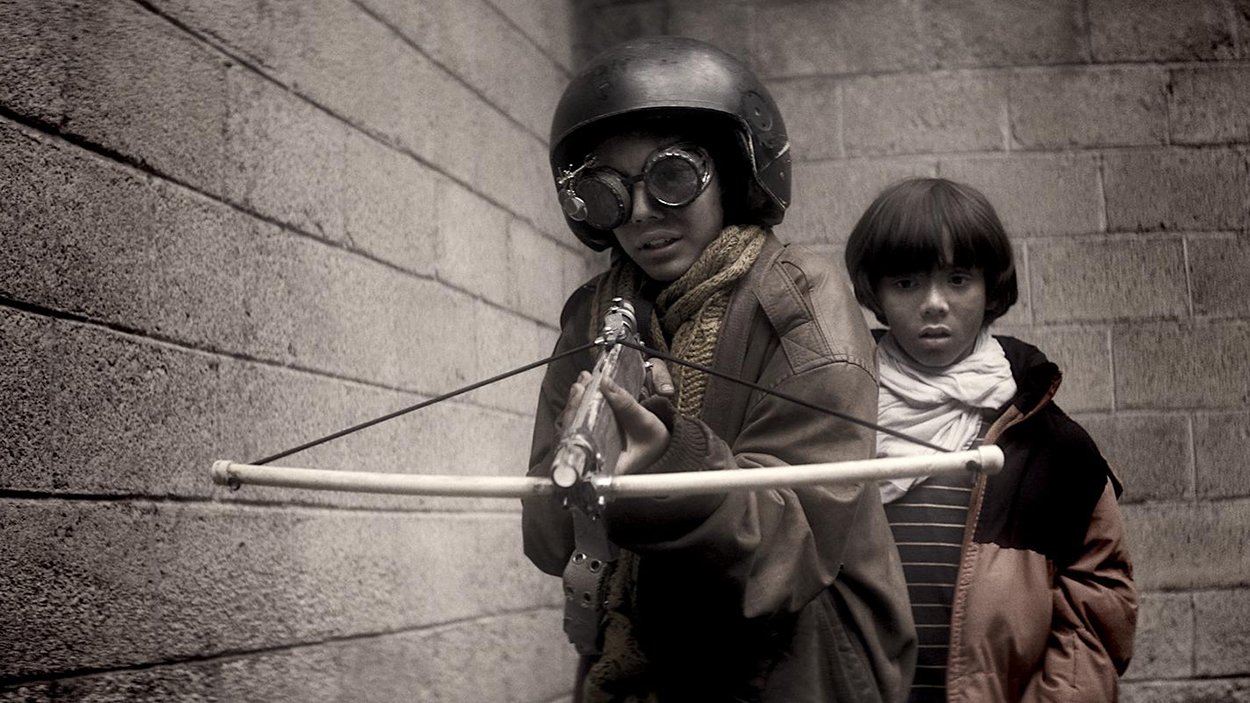Parvulos (FANTASTIC) Imagines Growing Up in the Apocalypse
Title: Parvulos
First Non-Festival Release: November 7, 2024 (Theatrical Release)
Director: Isaac Ezban
Writer: Ricardo Aguado-Fentanes, Isaac Ezban
Runtime: 119 Minutes
Starring: Farid Escalante Correa, Leonardo Cervantes, Mateo Ortega Cassilas
Where to Watch: Check out where to find it here
This film’s review was written after its screening at the Fantastic Film Festival in 2024.
There are only two constants in life: family and change. A sentimental, and largely accurate, statement, its truth lies within the comfort and uncertainty both bring to life.
This refrain punctuates the beginning and end of Parvulos. Three brothers Salvador (Farid Escalante Correa), Oliver (Leonardo Cervantes), and Benjamin (Mateo Ortega Cassilas) live in a house in the middle of the woods and wait for their parents return from a supply run. Surviving through cooperation, hard work, and evading the zombies and other hidden dangers lurking in the forest, the boys manage on their own. When Benjamin learns the truth of why he cannot enter their cellar, the boy’s careful existence is shattered by the revelations of what it means to survive.
Parvulos is a thoroughly capable, if familiar, take on the apocalypse and the family ties that persevere through it.
Roping the audience into the terrifying reality of the apocalypse, writer/director Isaac Ezban and co-writer Ricardo Aguado-Fentanes build a world realistically crumbling after scientific intervention. Like many post-apocalyptic films, Parvulos interrogates the ways in which society breaks down following a catastrophic event. Roaming gangs of evangelicals butchering up those deemed unworthy of saving and rumors of small supplies of Russian created vaccines allow the horror to naturally seep through the narrative. Distrust of the vaccines make for an important plot element that mirrors reality all too well. Since the viral epidemic in Parvulos comes about through a failed vaccine, there is understandable doubt amongst some characters at the efficacy of such a miracle after the disastrous results of one previously. Without parents to guide them, the boys grow up in a world where they have to navigate these realities with uncertainty, making them forge their own paths as a unit and as individuals.
While the problems of the world weigh on the boys, their internal conflicts drive the narrative much further. Barely a teenager himself, Salvador is forced into a fatherly role protecting his younger two siblings from the horrors of the world while working overtime to compensate for his disability. Where his strength would be his biggest asset, he is forced to rely on his wits and his brothers to carry out tasks with him. This leads to friction between the empathetic-to-a-fault Oliver and the stubborn and hot-headed Benjamin. The younger two carry their weight but have different ideas about life and survival than Salvador. Oliver, often the swing vote in times of trouble, finds himself siding with his brothers depending on the situation, driving the rift further whenever a difficult decision must be made. Their conflict feels real given the boys’ fleshed out motivations and character dynamics giving Parvulos plenty to chew on when the action lulls.
Shining through muted colors and crumbling set design, Parvulos makes its post-apocalyptic forest come to life while showing how life has changed for these boys. Shot in a dull gradient, colors rarely flow through in Parvulos, unless Ezban wants to shine on a particular moment of joy or draw a viewer’s attention to something otherwise important. While the colors aren’t pretty, they do paint a picture of what life looks like for the boys, making it an effective choice all the same. Much like the ruins of the world they inhabit, Parvulos isn’t shy about making its guesses on how infrastructure breaks under lack of management. Buildings give way to nature, after men rife through them, and slowly resources dwindle to the point where creativity is needed to survive. Even in the boy’s sanctuary of a home, there’s an element of constantly maneuvering and reinforcing their little resources that gives the film a scrappy feel.
The biggest misstep comes into play in the second act when a tone shift takes hold for roughly ten minutes before returning back to the film’s bleak roots. Once Benjamin learns the truth about what is hidden in the basement, Parvulos takes a laughable turn that feels largely out-of-place in the tense survival film. Moments of joy are few and fleeting in a world like this, but the suddenness of this revelation and its execution leaves much to be desired. Thankfully, it is short-lived, as Parvulos shifts back into its grittier moments once the silliness runs its course.
It isn’t Ezban’s strongest horror effort, but the personal meaning behind it seeps through all the same to create a wonderfully tragic examination of coming-of-age in a horrific time. Parvulos is thoughtful, horrific, and, at times, quite humorous in its intimate portrayal of the apocalypse. Its odd tone shift aside, Parvulos does enough to carve its own niche out in a populated sub-genre known for its predictability. If you want to find out how children can make sense of the end of the world, look no further than Mexico’s very own Parvulos.
Overall Score? 7/10


